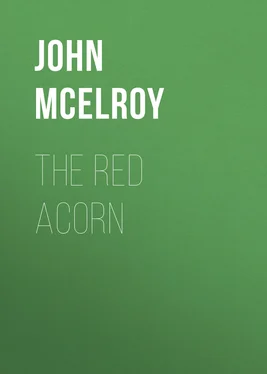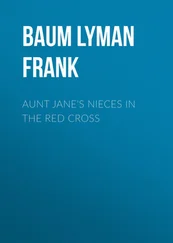John McElroy - The Red Acorn
Здесь есть возможность читать онлайн «John McElroy - The Red Acorn» — ознакомительный отрывок электронной книги совершенно бесплатно, а после прочтения отрывка купить полную версию. В некоторых случаях можно слушать аудио, скачать через торрент в формате fb2 и присутствует краткое содержание. Жанр: foreign_prose, История, foreign_edu, foreign_antique, на английском языке. Описание произведения, (предисловие) а так же отзывы посетителей доступны на портале библиотеки ЛибКат.
- Название:The Red Acorn
- Автор:
- Жанр:
- Год:неизвестен
- ISBN:нет данных
- Рейтинг книги:4 / 5. Голосов: 1
-
Избранное:Добавить в избранное
- Отзывы:
-
Ваша оценка:
- 80
- 1
- 2
- 3
- 4
- 5
The Red Acorn: краткое содержание, описание и аннотация
Предлагаем к чтению аннотацию, описание, краткое содержание или предисловие (зависит от того, что написал сам автор книги «The Red Acorn»). Если вы не нашли необходимую информацию о книге — напишите в комментариях, мы постараемся отыскать её.
The Red Acorn — читать онлайн ознакомительный отрывок
Ниже представлен текст книги, разбитый по страницам. Система сохранения места последней прочитанной страницы, позволяет с удобством читать онлайн бесплатно книгу «The Red Acorn», без необходимости каждый раз заново искать на чём Вы остановились. Поставьте закладку, и сможете в любой момент перейти на страницу, на которой закончили чтение.
Интервал:
Закладка:
Questions and congratulations were showered upon him, but he replied incoherently, and gasped a request for water, as if he were perishing from thirst. While some hunted for this, others sought for traces of the Rebels; so he gained time to fix up a fairly presentable story of a desperate and long-continued bayonet struggle in which he was behaving with the greatest gallantry, although nearly hopeless of success, when the arrival of help changed the aspect of matters. He had so many gaping wounds to confirm the truth of this story, that it was implicitly believed, and he was taken back to camp as on e of the foremost heroes of that eventful day. The Colonel made him a Sergeant as soon as he heard the tale, and regretted much that he could not imitate the example of the great Napoleon, and raise him to a commission, on the scene of his valiant exploits. His cot at the hospital was daily visited by numbers of admiring comrades, to whom he repeated his glowing account of the fight, with marked improvements in manner and detail accompanying every repetition.
He had no desire to leave the hospital during his term of service, but his hurts were all superficial and healed rapidly, so that in a fortnight’s time the Surgeon pronounced him fit to return to duty. He cursed inwardly tha officer’s zeal in keeping the ranks as full as possible, and went back to his company to find it preparing to go into another fight.
“Hello, Jake,” said his comrades, “awful glad to see you back. Now you’ll have a chance to get your revenge on those fellows. There’ll be enough of us with you to see that you get a fair fight.”
“To the devil with their revenge and a fair fight,” said Jake to himself. That evening he strolled around to the headquarters tent, and said to the commander of the regiment:
“Colonel, the doctor seems to think that I’m fit to return to duty, but I don’t feel all right yet. I’ve a numbness in my legs, so that I kin hardly walk sometims. It’s my old rheumatics, stirred up by sleeping out in the night air. I hear that the man who’s been drivin’ the headquarters wagin has had to go to the hospital. I want to be at something, even if I can’t do duty in the ranks, and I’d like to take his place till him and me gets well.”
“All right, Sergeant. You can have the place as long as you wish, or any other that I can give you. I can’t do too much for so brave a man.”
So it happened that in the next fight the regiment was not gratified by any thrilling episodes of sanguinary, single-handed combats, between the indomitable Jake and bloodthirsty Rebels.
He had deferred his “revenge” indefinitely.
Chapter IV. Disgrace
For of fortune’s sharp adversitie
The worst kind of infortune is this:
A man that hath been in prosperitie,
And it remember when it passed is.
Harry Glen’s perfect self-complacency did not molt a feather when the victors returned to camp flushed with their triumph, which, in the eyes of those inexperienced three-months men, had the dimensions of Waterloo. He did not know that in proportion as they magnified their exploit, so was the depth of their contempt felt for those of their comrades who had declined to share the perils and the honors of the expedition with them. He was too thoroughly satisfied with himself and his motives to even imagine that any one could have just cause for complaint at anything he chose to do.
This kept him from understanding or appreciating the force of the biting innuendoes and sarcasms which were made to his very face; and he had stood so aloof from all, that there was nobody who cared to take the friendly trouble of telling him how free the camp conversation was making with his reputation.
He could not help, however, understanding that in some way he had lost caste with the regiment: but he serenely attributed this to mean-spirited jealousy of the superior advantages he was enjoying, and it only made him more anxious for the coming of the time when he could “cut the whole mob of beggars,” as Ned Burnleigh phrased it.
A few days more would end the regiment’s term of service, and he readily obtained permission to return him in advance.
The first real blow his confidence received was when he walked down the one principal street of Sardis, and was forced to a perception of the fact that there was an absence of that effusive warmth with which the Sardis people had ever before welcomed back their young townsman, of whose good looks and gentlemanliness they had always been proud. Now people looked at him in a curious way. They turned to whisper to each other, with sarcastic smiles and knowing winks, as he came into view, and they did not come forward to offer him their hands as of old. It astonished him that nobody alluded to the company or to anything that had happened to it.
Turning at length from the main street, he entered the lateral one leading to his home. As he did so, he heard one boy call out to another in that piercing treble which boys employ in making their confidential communications to one another, across a street,
“S-a-y-, did you know that Hank Glen ‘d got back? and they say he looks pale yet?”
“Has he?” the reply came in high falsetto, palpably tinged with that fine scorn of a healthy boy, for anything which does not exactly square with his young highness’s ideas. “Come back to mammy, eh? Well, it’s a pity she ever let him go away from her. Hope she’ll keep him with her now. He don’t seem to do well out of reach of her apron strings.”
The whole truth flashed upon him: Envious ones had slandered him at home, as a coward.
He walked onward in a flurry of rage. The thought that he had done anything to deserve criticism could not obtrude itself between the joints of his triple-plated armor of self-esteem.
A swelling contempt for his village critics flushed his heart.
“Spiteful, little-minded country boobies,” he said to himself with an impatient shake of his head, as if to adjust his hair, which was his usual sign of excitement, “they’ve always hated me because I was above them. They take advantage of the least opportunity to show their mean jealousy.”
After a moment’s pause: “But I don’t care. I’d a little rather have their dislike than their good-will. It’ll save me a world of trouble in being polite to a lot of curs that I despise. I’m going to leave this dull little burg anyhow, as soon as I can get away. I’m going to Cincinnati, and be with Ned Burnleigh. There is more life there in a day than here in a year. After all, there’s nobody here that I care anything for, except father and mother—and—Rachel.”
A new train of thought introduced itself at this tardy remembrance of his betrothed. His heat abated. He stopped, and leaning against a shady silver maple began anew a meditation that had occupied his mind very frequently since that memorable night under the old apple tree on the hill-top.
There had been for him but little of that spiritual exaltation which made that night the one supreme one in Rachel’s existence; when the rapture of gratified pride and love blended with the radiant moonlight and the subtle fragrance of the flowers into a sweet symphony that would well chord with the song the stars sang together in the morning.
He was denied the pleasure that comes from success, after harrowing doubts and fears. His unfailing consciousness of his own worth had left him little doubt that a favorable answer would promptly follow when he chose to propose to Rachel Bond, or to any other girl, and when this came with the anticipated readiness, he could not help in the midst of his gratification at her assent the intrusion of the disagreeable suspicion that, peradventure, he had not done the best with his personal wares that he might. Possibly there would appear in time some other girl, whom he might prefer to Rachel, and at all events there was no necessity for his committing himself when he did, for Rachel “would have kept,” as Ned Burnleigh coarsely put it, when made the recipient of Harry’s confidence.
Читать дальшеИнтервал:
Закладка:
Похожие книги на «The Red Acorn»
Представляем Вашему вниманию похожие книги на «The Red Acorn» списком для выбора. Мы отобрали схожую по названию и смыслу литературу в надежде предоставить читателям больше вариантов отыскать новые, интересные, ещё непрочитанные произведения.
Обсуждение, отзывы о книге «The Red Acorn» и просто собственные мнения читателей. Оставьте ваши комментарии, напишите, что Вы думаете о произведении, его смысле или главных героях. Укажите что конкретно понравилось, а что нет, и почему Вы так считаете.












